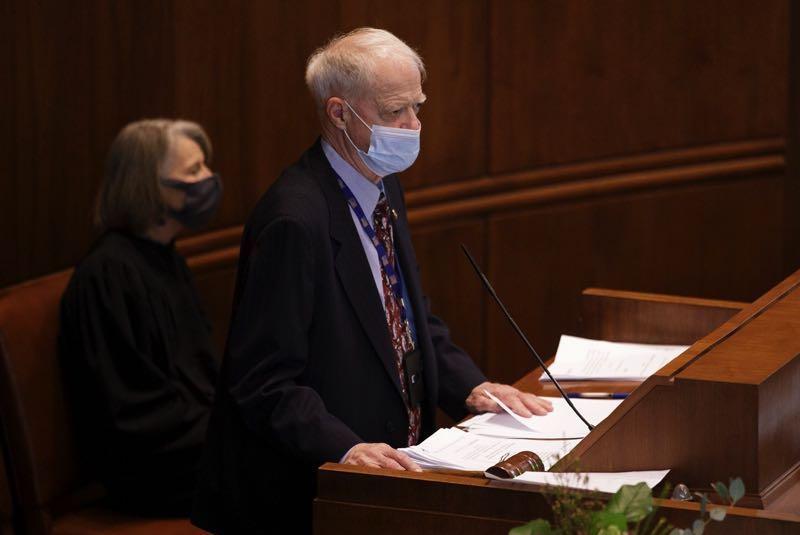
Oregon lawmakers made the most of federal and state money, some of it one-time dollars, in a new effort to expand a mental health system where the demand for services far outstripped its capacity for treatment.
They did so even as the coronavirus pandemic and economic downturn threatened to force them to cut spending and shift money to other priorities during the current two-year budget cycle, which began July 1.
But a combination of factors — unexpected federal aid, resilient state tax collections and a ballot measure that redirected marijuana taxes — helped lawmakers not only avert cuts but channel around half a billion dollars into expansion of mental health programs.
Senate President Peter Courtney gave much of the credit to the co-leaders of the joint budget subcommittee that did the detailed work — Rep. Rob Nosse and Sen. Kate Lieber — and the House Behavioral Health Committee led by Rep. Tawna Sanchez. All are Democrats from Portland.
But Courtney, the veteran Democrat from Salem, is a longtime champion of mental health. Money generated by a 15-cent-per-pack increase in state cigarette taxes that he advocated and lawmakers approved in a 2013 special session went to mental health programs for children and teenagers. He regretted then there was not enough to pay for a full spectrum of programs covering adults — but that has changed with this year's session.
"This is a historic investment. It will save lives. We must help children and adults struggling with mental illnesses from falling through the cracks," Courtney said.
But he and others said the groundwork must be laid for spending the money where it can make a difference — and in the overall context of health care.
"Until we treat mental health like we treat the rest of health care, we're not doing enough," he said.
More capacity
The money, however, is not simply for business as usual.
The largest item will cost $130 million, split between state money from the tax-supported general fund and federal money from President Joe Biden's pandemic recovery plan known as the American Rescue Plan Act.
Oregon will have to come up with a plan to increase the number of people served by licensed residential treatment facilities and supportive housing designated for those with mental health needs. That plan for additional capacity is due to the Legislature's human services budget subcommittee by March 1.
Another $50 million is subject to release by the Emergency Board, the 20 lawmakers who decide budget issues between sessions. The money will tie funding for mental health programs to their responsibilities, incentives and patient outcomes. A third-party evaluator will look at how well coordinated-care organizations run such programs if they choose to.
Another $80 million is earmarked for incentives to increase the number and diversity of people who work in mental health and drug treatment. Lawmakers heard testimony that funding of programs alone will not resolve workforce shortages.
The budget also provides $121 million, mostly federal money, for continued support of Oregon's 12 certified community behavioral health centers. Five of them are in the metro counties — two in Multnomah, two in Washington, one in Clackamas — and one each in Columbia and Yamhill counties. These centers, which exist in other states, provide mental health and substance abuse treatment regardless of someone's ability to pay.
Other items
Other parts of the mental health funding package:
• $31 million for two new 24-bed patient units and 110 staff positions at the Oregon State Hospital campus in Junction City.
• $20 million for an incentive fund for behavioral health housing.
• $10 million for mobile crisis intervention teams.
• $9.2 million for transitional housing for young adults between ages 17 and 25, in the form of four 5-bed residential treatment homes and a 10-bed secure residential treatment facility.
• $6.5 million for mobile crisis response and stabilization services for children.
• $6 million for four peer respite centers to provide services to individuals experiencing a behavioral health crisis. A center will be set up in each of four regions: the Portland metropolitan area, Southern Oregon, Central and Eastern Oregon, and the Oregon Coast.
• $5.7 million for services of interdisciplinary assessment teams for youth with intensive behavioral health needs.
• $5 million for a 9-8-8 crisis hotline center. A federal regulation that takes effect in mid-2022 sets up 988 as the universal number for people to seek help in a mental health crisis.
The state budget also contains $302 million for treatment services required under a ballot measure that voters approved in the 2020 general election. Measure 110 removes criminal penalties for possession of specified amounts of drugs and redirects state taxes on marijuana — which voters legalized in 2014 — into drug treatment programs.
Also in the budget, but outside the package listed above:
• $21.5 million for counties to provide community-based restoration services for individuals unable to aid and assist in their own defense at trial, known as "aid and assist" patients.
• $1.5 million for tribes for their behavioral health practices.
• $7.5 million for 47 more beds for psychiatric residential treatment services for children and adolescents. Estimates are that 200 of them will have stays averaging 10 to 12 weeks.
You can reach Peter Wong at [email protected]
This story was originally published by Portland Tribune.

